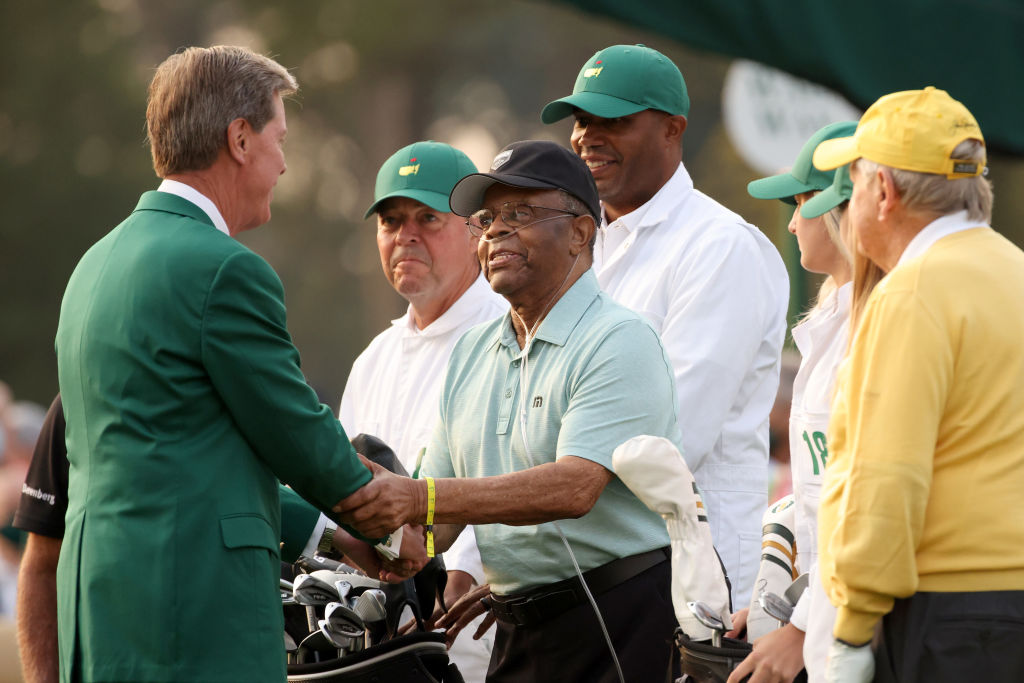A PIONEER of golf, who broke the golf's glass ceiling for minorities has died today. Lee Elder, who became the first Black golfer to play at the Masters has passed away at the age of 87, the PGA Tour confirmed on Monday.
The standout moment for Elder happened in 1975, when he became the first black golfer to play at the Masters, an event and competition that many people felt was rooted in racism and unprecedented favorability toward white people.
His achievments and status in the game were recognised this year alongside Jack Nicklaus and and Gary Player as an honoury starter in the ceremonial first tee shot to begin the tournament.
 AUGUSTA, GEORGIA - APRIL 08: Honorary starter Lee Elder of the United States shakes hands with Masters Chairman Fred Ridley. (Photo by Kevin C. Cox/Getty Images)
AUGUSTA, GEORGIA - APRIL 08: Honorary starter Lee Elder of the United States shakes hands with Masters Chairman Fred Ridley. (Photo by Kevin C. Cox/Getty Images)He became one of golf's most recognisable faces, but that came with its problems.
The pioneer was refused entry to the clubhouse and had to change in the parking lot, had a ball thrown into a hedge by a spectator and also received death and intimidation threats before his breakthrough tournament,
He told CNN in 2015 that his first masters was a daunting task even after he received death threats leading up to the competition. He received one message warning him that “he ought to check behind every tree” as he completed his round.
Elder had qualified for the Masters courtesy of a tournament victory in Pensacola, Florida.
Lee Elder has passed away at the age of 87.
In 1975, he made history as the first African American to compete in the Masters Tournament.
Lee was honored this past April at Augusta National and his legacy will surely live on. pic.twitter.com/1o05rephKt— PGA TOUR (@PGATOUR) November 29, 2021
Because of the tactics aimed at Elder he considered whether accepting the invitation to the Masters was the right thing to do.
“It was frightening. You try to eliminate the possibility of anything happening,” he said. “That was part of the reason for renting two houses during the Masters week. The logic behind that was the fact we did not want the people to know where I was staying.”
"I did consider not going," Elder says. "It was on my mind and I think the reason why I had thought about it was because it had been so difficult qualifying for the Masters.
He said it took him about a week or so to make up his mind. "I knew it was something I had wanted ever since I came on the Tour.
"I think the reason why was there had been so much talk about no Black man playing at Augusta, and after all that, I wasn't going to qualify and not go."
Elder would go on to become the first Black man to represent the United States Ryder Cup team when he played in the 17-11 win over Europe in 1979.
Renee Powell, the second Black woman to compete on the Ladies Professional Golf Association (LPGA) Tour and Elder's friend, posted on Facebook that she was "very saddened" by the news.
"Lee had called me last week about doing a project together this summer," Powell
A legend. A gentleman. A trailblazer.
Lee Elder, the first Black golfer to play in @TheMasters, dies at age 87. pic.twitter.com/5gCfJTq5Zc— Golf Channel (@GolfChannel) November 29, 2021

